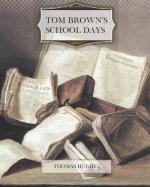“Tea or coffee, sir?” says head waiter, coming round to Tom.
“Coffee, please,” says Tom, with his mouth full of muffin and kidney. Coffee is a treat to him, tea is not.
Our coachman, I perceive, who breakfasts with us, is a cold beef man. He also eschews hot potations, and addicts himself to a tankard of ale, which is brought him by the barmaid. Sportsman looks on approvingly, and orders a ditto for himself.
Tom has eaten kidney and pigeon-pie, and imbibed coffee, till his little skin is as tight as a drum; and then has the further pleasure of paying head waiter out of his own purse, in a dignified manner, and walks out before the inn-door to see the horses put to. This is done leisurely and in a highly-finished manner by the hostlers, as if they enjoyed the not being hurried. Coachman comes out with his waybill, and puffing a fat cigar which the sportsman has given him. Guard emerges from the tap, where he prefers breakfasting, licking round a tough-looking doubtful cheroot, which you might tie round your finger, and three whiffs of which would knock any one else out of time.
The pinks stand about the inn-door lighting cigars and waiting to see us start, while their hacks are led up and down the market-place, on which the inn looks. They all know our sportsman, and we feel a reflected credit when we see him chatting and laughing with them.
“Now, sir, please,” says the coachman. All the rest of the passengers are up; the guard is locking up the hind-boot.
“A good run to you!” says the sportsman to the pinks, and is by the coachman’s side in no time.
“Let ’em go, Dick!” The hostlers fly back, drawing off the cloths from their glossy loins, and away we go through the market-place and down the High Street, looking in at the first-floor windows, and seeing several worthy burgesses shaving thereat; while all the shopboys who are cleaning the windows, and housemaids who are doing the steps, stop and look pleased as we rattle past, as if we were a part of their legitimate morning’s amusement. We clear the town, and are well out between the hedgerows again as the town clock strikes eight.
The sun shines almost warmly, and breakfast has oiled all springs and loosened all tongues. Tom is encouraged by a remark or two of the guard’s between the puffs of his oily cheroot, and besides is getting tired of not talking. He is too full of his destination to talk about anything else, and so asks the guard if he knows Rugby.
“Goes through it every day of my life. Twenty minutes afore twelve down—ten o’clock up.”
“What sort of place is it, please?” says Tom.
Guard looks at him with a comical expression. “Werry out-o’-the-way place, sir; no paving to streets, nor no lighting. ‘Mazin’ big horse and cattle fair in autumn—lasts a week—just over now. Takes town a week to get clean after it. Fairish hunting country. But slow place, sir, slow place-off the main road, you see—only three coaches a day, and one on ’em a two-oss wan, more like a hearse nor a coach—Regulator—comes from Oxford. Young genl’m’n at school calls her Pig and Whistle, and goes up to college by her (six miles an hour) when they goes to enter. Belong to school, sir?”




